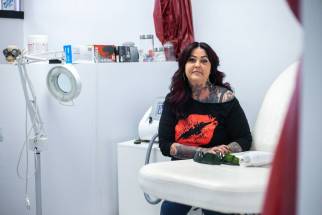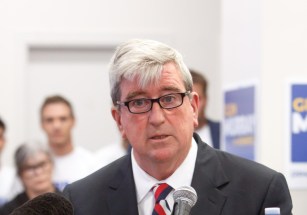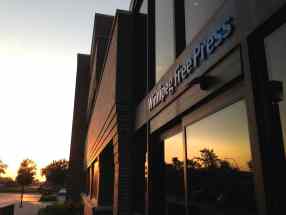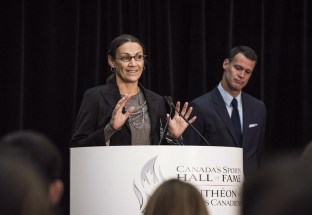The inside word As the Free Press marks 150, staff members reflect on what the newspaper means to them
Read this article for free:
or
Already have an account? Log in here »
To continue reading, please subscribe:
Monthly Digital Subscription
$0 for the first 4 weeks*
- Enjoy unlimited reading on winnipegfreepress.com
- Read the E-Edition, our digital replica newspaper
- Access News Break, our award-winning app
- Play interactive puzzles
*No charge for 4 weeks then price increases to the regular rate of $19.00 plus GST every four weeks. Offer available to new and qualified returning subscribers only. Cancel any time.
Monthly Digital Subscription
$4.75/week*
- Enjoy unlimited reading on winnipegfreepress.com
- Read the E-Edition, our digital replica newspaper
- Access News Break, our award-winning app
- Play interactive puzzles
*Billed as $19 plus GST every four weeks. Cancel any time.
To continue reading, please subscribe:
Add Free Press access to your Brandon Sun subscription for only an additional
$1 for the first 4 weeks*
*Your next subscription payment will increase by $1.00 and you will be charged $16.99 plus GST for four weeks. After four weeks, your payment will increase to $23.99 plus GST every four weeks.
Read unlimited articles for free today:
or
Already have an account? Log in here »
Hey there, time traveller!
This article was published 14/10/2022 (1151 days ago), so information in it may no longer be current.
You’ve seen their bylines, read their stories and columns, or viewed their photographs and video. And there are equally as many people who work behind the scenes editing stories and laying out pages for our print edition and website.
But you’ve yet to hear what it means to them to be part of the Free Press and our 150-year legacy of journalism.
As we mark our sesquicentennial, we invited 15 members of our newsroom to share with readers their thoughts on the role they play and the responsibility they feel to carry on the tradition that began in 1872.
Mikaela MacKenzie, Photojournalist
Joined the Free Press in 2018
Mikaela MacKenzie takes a self-portrait outside of the Free Press building. (Mikaela MacKenzie / Winnipeg Free Press)
I believe the best way to get to know a city is by working at a newspaper. By being a witness to the joy, the pain and the mundane of every single day, you get past the superficial and closer to the essence of what makes a place special. Seven years ago, I packed up a rusty station wagon and drove across the Prairies to start getting to know a province that I had only ever driven through before — Manitoba.
Ever since, I’ve been learning what makes it tick. I’ve covered news, food, politics, sports, arts, business and everything in between, and have done my best to show it all to our readers in a true and engaging way.
As a photojournalist, I see it all up close and in person. I get to shake hands, traipse across fields, taste homemade delicacies, run alongside marches and dodge errant footballs — but I think my favourite moment is when I get to sit in someone’s kitchen and hear their story, in their own words.
I learned about key moments in Manitoba history by looking through our archives, and now the images I take are added to this record that spans back 150 years. It doesn’t always seem like it, but by doing this job I get to witness history as it is written. It is an absolute privilege to have a front-row seat to life in this corner of the world.
Ryan Thorpe, Investigative reporter
Joined the Free press in 2017
Ryan Thorpe. (Mikaela MacKenzie / Winnipeg Free Press files)
The story of a newspaper is the story of the community it serves.
The pages of the Free Press — from the first edition printed in a shack along Main Street in 1872, all the way up to today — represent the history of this city and province.
It reflects our hopes and aspirations as a community, our perseverance in hard times and our celebrations in good, and our tragedies and triumphs.
To borrow an old journalism cliché: It is the rough draft of history for Winnipeg and Manitoba. Not written with the benefit and clarity of hindsight, but in the moment, on the front lines.
To work for a daily newspaper is to be in the business of daily miracles.
Each morning those pages are blank, and it is a monumental task — requiring a team effort and a lot of scrambling — to fill them by the time the presses roll in the night.
The fact those pages get filled each and every day, through snowstorms and floods and pandemics, week after week, month after month, year after year, truly does feel like a miracle.
And the next day you start all over again, from scratch, with nothing but blank pages.
But it is a privilege to tell the stories of this community, just as it is a privilege to be read by those who call Winnipeg and Manitoba home.
God willing, the Free Press will be here for another 150 years, telling our stories, performing its daily miracle.
Jill Wilson, Copy editor
Joined the Free Press in 2003
Jill Wilson in the newsroom. (Ruth Bonneville / Winnipeg Free Press)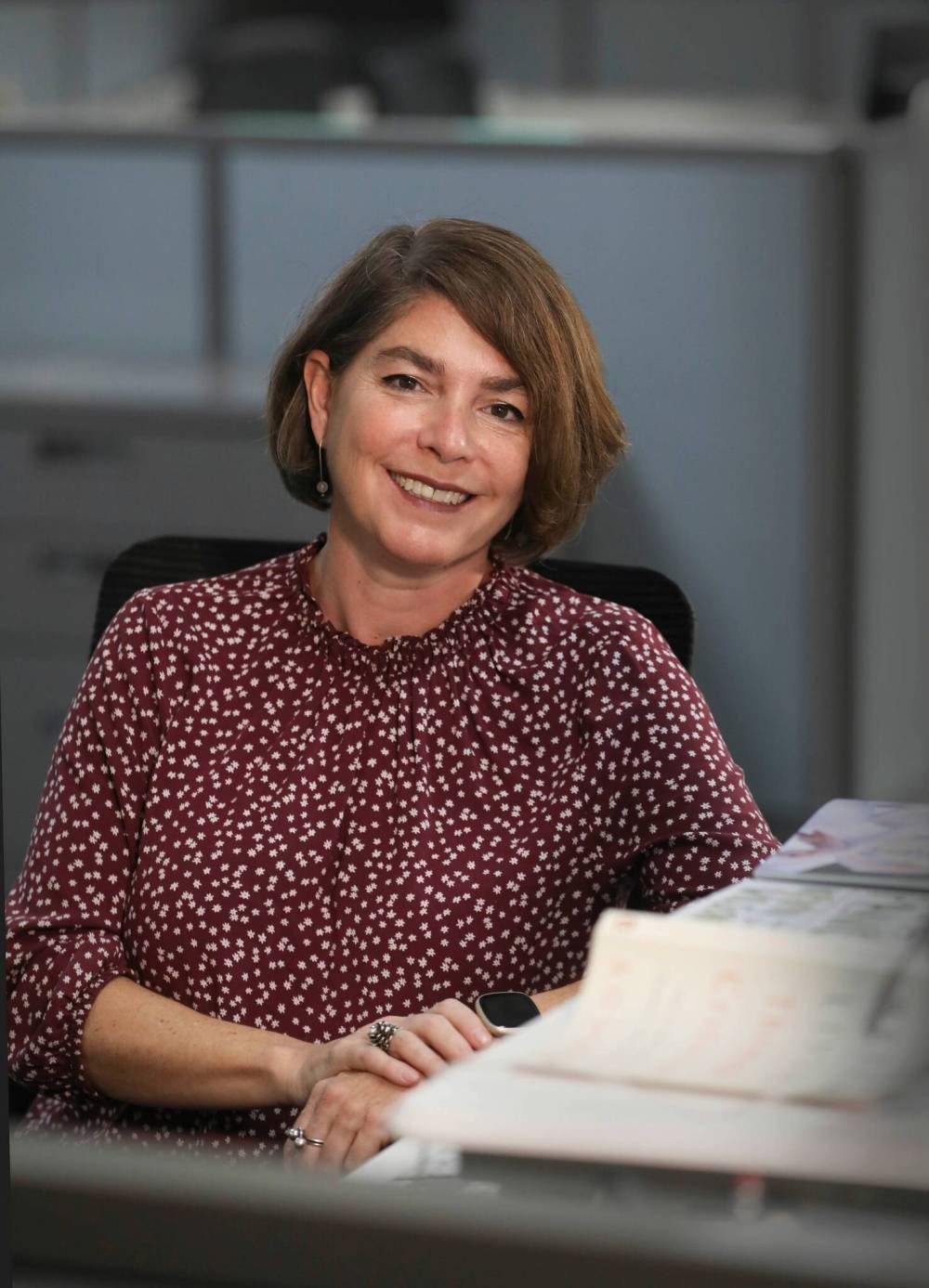
In my almost 20 years at the Free Press, I’ve been a copy editor, a paginator, a reporter and a reviewer, but I’ve spent the entirety of those two decades in the Arts & Life department. Art, music, theatre, books and movies give shape and nuance to the stories we tell ourselves about who we are, and Winnipeggers’ stories are unlike any others.
But if an aria is sung in a concert hall and no one is around to hear it, does it make a sound? An arts scene can’t thrive in the shadows, and newspapers give it light, whether it’s interviews with artists, previews of upcoming shows or reporting on budgets cuts and year-end surpluses.
In an era where we’re subjected to a firehose of information coming from every direction, how do we seek out what really matters, what’s worth our time? The Free Press not only brings 150 years of institutional knowledge to its coverage, it has never lost sight of the fact that critical writing is a vital part of the discourse.
In his book about the importance of critics, the New York Times’ A.O. Scott asks, “We laugh, cry, declare ourselves moved or troubled or seduced, but why? And to what end?”
When I look at the way newspapers across Canada have decimated their arts departments or, in some cases, eliminated them completely, I’m proud to be part of a team that sees the continued value in answering that question, in telling our own stories about the storytellers.
Niigaan Sinclair, Columnist
Joined the Free Press in 2018
Niigaan Sinclair on Selkirk Avenue in Winnipeg. (Mikaela MacKenzie / Winnipeg Free Press files)
While growing up, my family always had a copy of the Winnipeg Free Press on the living room table. After checking the hockey scores and reading the comics, I would then turn to learning about the world. For a young Indigenous kid, the newspaper was my window to the universe — and all the good, bad, beautiful and ugly parts in it.
Flipping through the pages, though, I would always look for people who looked like me. Unfortunately, the only Indigenous peoples I saw on its pages were those selling products or listed in Manitoba’s “most wanted.” There was that one time I appeared on the front page in 1986 — in a story about how, as a young boy, I was looking for Halley’s comet — but other than that it was always the same.
Now, almost four decades later, I work at the paper alongside inspiring Indigenous voices and one of the most culturally rich and critically aware newsrooms in the country. Indigenous peoples and our issues are featured in stories with community voices at the forefront and all of our complicatedness and complexities as different nations and cultures highlighted. Rarely does our front page not feature a story of Indigenous experiences.
In a province where one-fifth of our population is Indigenous peoples, any institution that purports to represent it must accurately reflect and embody the community at large. The Free Press does this, and I am proud of the work I produce and those I produce it with. For the first time in history, the Free Press truly embodies Manitoba in all of its complicated and complex parts, and it is better for it.
Carol Sanders, Legislature reporter
Joined the Free Press in 1997
Carol Sanders at the Manitoba Legislative Building. (Mikaela MacKenzie / Winnipeg Free Press)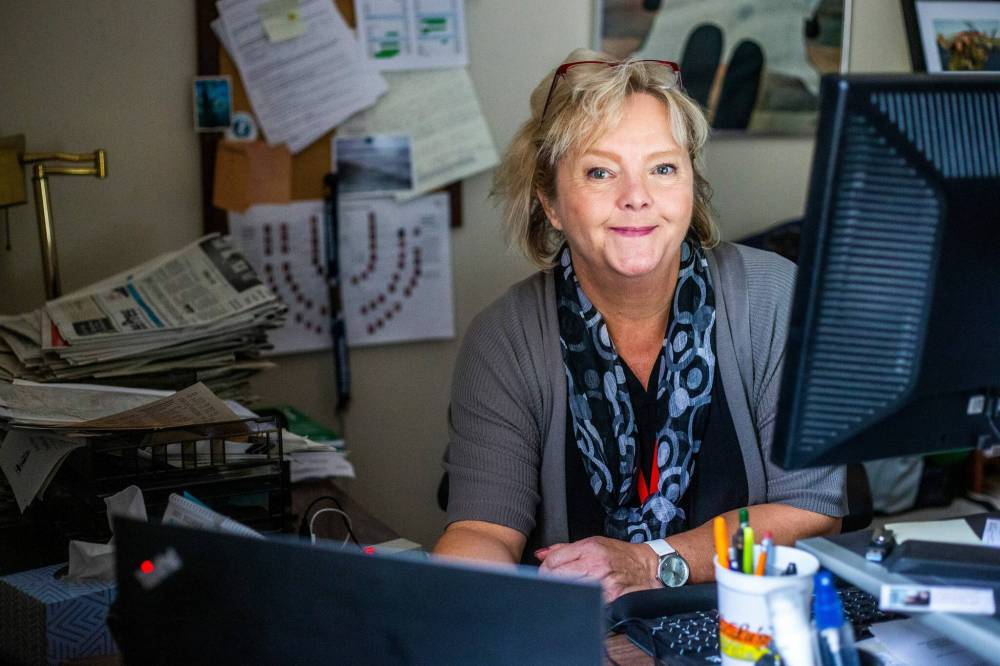
As the only local, independent news outlet with reporters based at the Manitoba legislature every day, the Free Press serves as the eyes and ears of the community under the dome on Broadway.
In a time of upheaval and uncertainty — and when democratic institutions like a free press are under threat — we’ve never stopped paying attention to government decision-making and how it affects Manitobans. It’s an honour and a responsibility that I take seriously.
And I’m proud to be one of the teams of women covering the legislature for the Free Press.
The paper’s first editor, W.F. Luxton, famously told pioneering ag reporter E. Cora Hind on its 10th anniversary that the newspaper business was “no place for a woman.”
Right now, the legislature is THE place for a woman — with a female premier, house speaker, lieutenant-governor and Free Press legislature bureau.
Joshua Frey-Sam, Sports reporter
Joined the Free Press in 2022
Joshua Frey-Sam. (Ruth Bonneville / Winnipeg Free Press)
I remember the first time I wrote for the Free Press as a journalism student. Just a seedling in the industry, I’ll admit I didn’t fully understand the massive role the Free Press played in Manitobans’ lives to that point, but you can bet I was brimming with excitement to have my byline in the paper every journalist talks about.
There was a palpable aura around writing for that name: the Free Press. One I could feel when I was told what my assignment would be. One that jolted my body with a rush of adrenalin as I tried to make deadline. It’s a feeling I believe has hooked anyone who has or currently works for the Free Press.
I’m still sprouting; I graduated from journalism school just a few months ago. To think I was given an opportunity to work at the Free Press as a permanent sports reporter this early in my career is still something I need to pinch myself about.
It’s an honour to work at the Free Press. That’s the simplest — and, admittedly, most clichéd — way I can put it.
There’s a weight, a standard, that you can feel while working here. One that’s been raised countless times over by some of the great reporters that have graced this province. No matter if you’re new or seasoned, you can’t help but recognize the privilege you have to work at a paper that impacts the lives of so many Manitobans each day.
Shelley Cook, Columnist, Reader Bridge manager
Joined the Free Press in 2021
Shelley Cook in the newsroom. (Ruth Bonneville / Winnipeg Free Press)
Sometimes I still can’t believe I work at the Free Press. For more than two years I’ve had the absolute privilege of sharing stories and taking up my little piece of space in the newspaper and online every Monday. It’s an honour I don’t take lightly.
I say this sincerely and in complete awe as I think about it: This is what I have always wanted to do; share stories and transcribe the world around me into my own words. I never thought it was possible because, growing up I seldom saw people like me represented in media. I am so happy to be here, taking up the space given to me. It means so much to me to have this chance to do that.
I’ve grown up with the Free Press. I remember the newspaper deconstructed in a neat pile on our dining room table every day; at least when I was old enough to take notice. It was (and still is) a trusted source of access to the world around us that we didn’t otherwise have passage to, and that I think we often took for granted. Seeing now how a daily newspaper comes together; the high energy and intensity of the news desk and the power of editorial staff who, each in their own ways of writing and meeting deadlines, bring these stories together day in, day out, is an incredible task.
I am proud of the work we are doing to make the Free Press better and more representative of the community we live in, and the people whose stories we share. I humbly acknowledge that we still have plenty of work left to do and am grateful for the chance to be part of that responsibility.
Chad Scarsbrook, Copy editor
Joined the Free Press in 2011
Chad Scarsbrook in the Free Press newsroom. (Mikaela MacKenzie / Winnipeg Free Press)
“Old fool: Venerable clergyman deserts his wife for a wanton”
“Hanging too good for him”
“Less bowel trouble in Winnipeg”
The early Manitoba Free Press copy editors sure knew how to have fun. The above headlines appeared in late 19th- and early 20th-century editions of the Free Press, a time when newspapers were apparently OK with printing just about anything.
I’m one of a group of editors behind the scenes at the paper whose job is quality control. It’s our responsibility to read stories, fact-check, correct spelling and style issues, and confer with reporters if necessary. We also write headlines and photo captions.
If we make a mistake at our job, there’s a chance 750,000 of our closest friends will find out.
We work at a different building now than when the Free Press first came off the presses in 1872, but the ghosts of editors, reporters and photographers past are still felt. The clippings, photo archives and front pages displayed in the newsroom are a daily reminder of the ink-stained wretches who paved the way in earning the trust of readers.
While the industry is much different now, a lot of the same stresses remain — scouring for story ideas, fighting writer’s block and battling the ever-ticking clock, to name a few.
Some things never change.
This little independent newspaper had a spot on my kitchen table growing up, and there’s still a spot for it today in this rapidly changing world of journalism.
Guess it’s a Winnipeg thing.
Shifa Naseer, Multimedia producer
Joined the Free Press in 2022
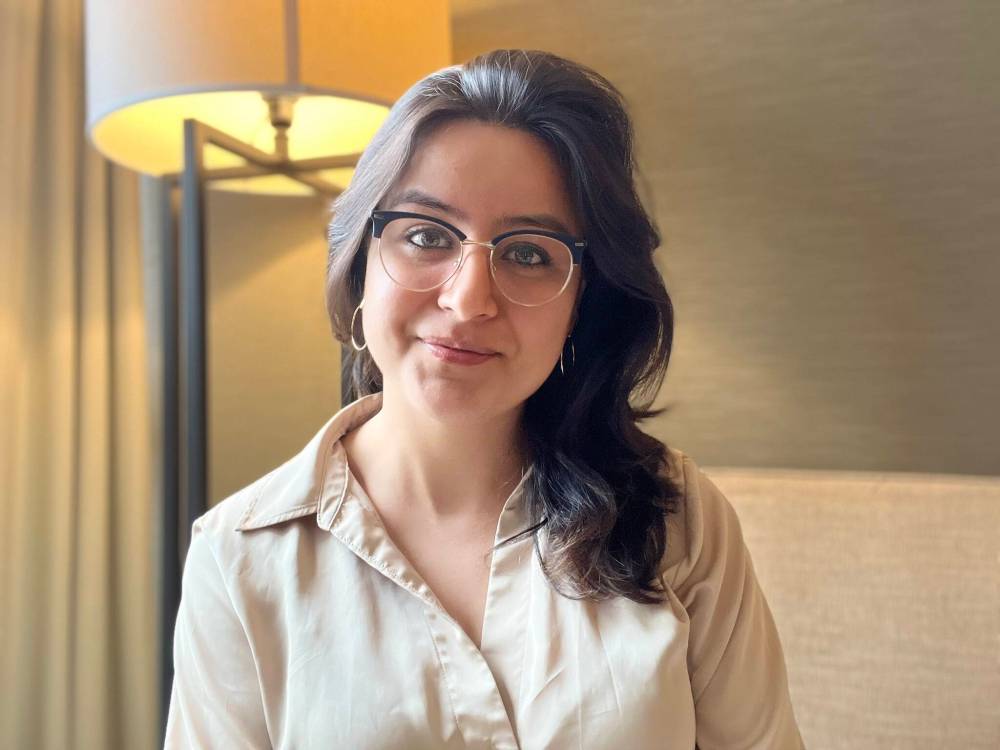
Even though the pandemic has made the newsroom a cloud — dispersed, yet connected and co-ordinated — the times when I do go to the office, walking along the hallways and sitting in the third-floor editorial department remind me how prestigious the Free Press is.
The giant Tyndall stone archway — a replica of the ones that graced the newspaper’s longtime downtown home at 300 Carlton St. — in the atrium of our present-day location at 1355 Mountain Ave. speaks of decades of telling stories. It bears witness to the scores of Free Press reporters who bustled around recording everyday history as it unfolded.
Authenticity, originality and ethical reporting are prized qualities these days, given the flood of information that is available so easily. It is a huge responsibility to maintain these principles when it comes to journalism. I have seen the same being executed here and it is exciting to deliver these stories to our readers.
As one of the more recent Free Press hires, it’s humbling to realize that I am part of this crowd and part of this legacy. It makes me want to contribute more and be more active in the everyday process, so I can hope to be worthy of having my name be part of the group that makes up the Free Press.
Carl DeGurse, Senior copy editor
Joined the Free Press in 2001
Carl DeGurse at his desk in the newsroom. (Mikaela MacKenzie / Winnipeg Free Press)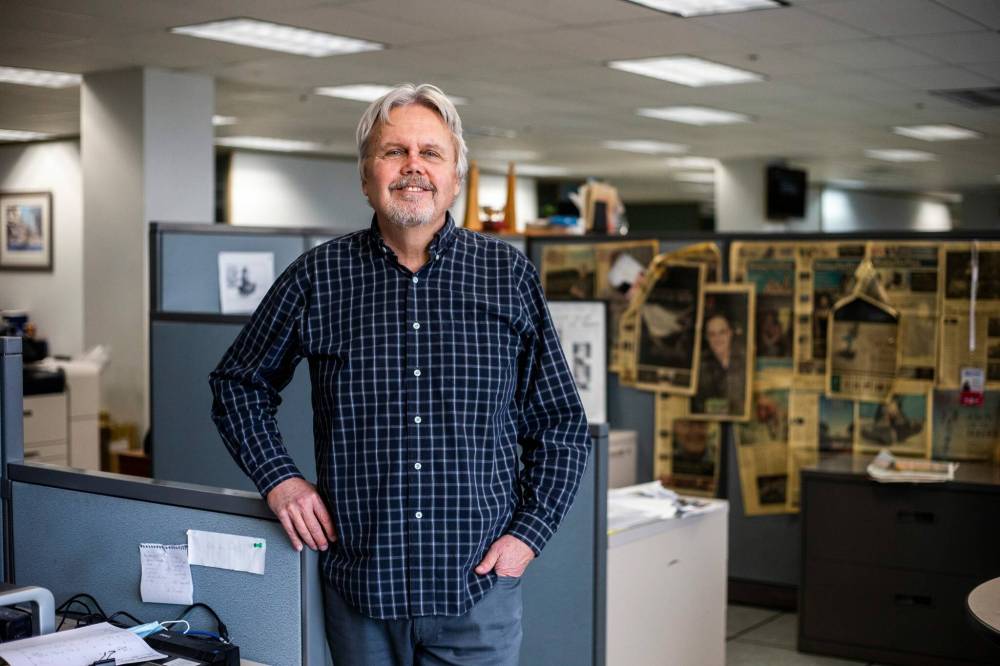
On a door into the coatroom of the Free Press newsroom, there are replicas of historic newspapers, including the front page of the March 21, 1927, edition of the Manitoba Free Press. A small story at the bottom of the page is headlined Editor garroted in Queens Village, N.Y., home.
Although the editor who was strangled with picture wire was not from here, the story offers sombre lessons to all Free Press newsroom staff as we doff our coats. First, don’t underestimate how passionate readers can be about their newspaper. Second, install a good security system in our homes.
A part of the paper guaranteed to provoke passionate reaction from readers is the opinion section, which includes columns, editorials and letters to the editor. The nature of opinions is that they are often deeply held and vigorously argued, which often makes for high-spirited encounters with people who feel driven to right the wrongs of their fellow Manitobans.
There are plenty of other places to express opinions these days. The rise of social media gave everyone a voice, although online forums often degenerate into shouting matches, threats and blind insistence on fake facts (we’re thinking of you Donald Trump).
By contrast, the opinion section of the Free Press is curated. We check facts, we air a variety of opinions, we rank reason over bluster and we don’t let writers use triple exclamation marks.
For 150 years, through the support of subscribers, the Free Press has maintained a fair forum for ideas and opinions about issues important to Manitoba. Long may the public conversation continue.
Leesa Dahl, Graphic artist
Joined the Free Press in 1986
Leesa Dahl in the Winnipeg Free Press newsroom. (Mikaela MacKenzie / Winnipeg Free Press)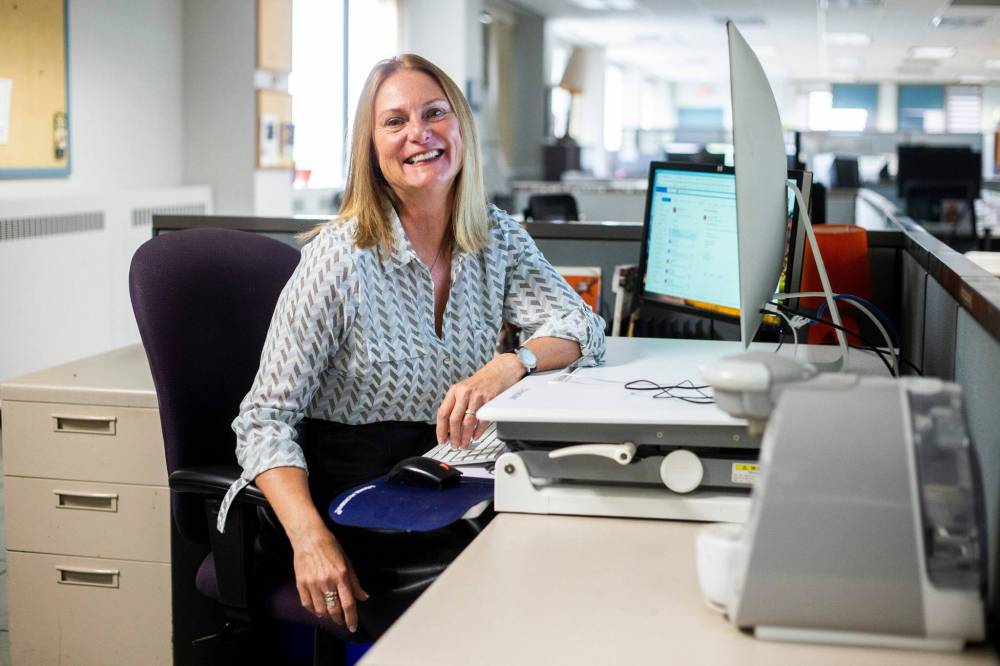
I had just turned 19 when former Free Press assistant managing editor Dave Lee hired me as a copyboy, a now-defunct position that, back in its day, was more an introductory lesson in the merciless decorum of a fast-paced, hard-hitting newsroom.
I lied at my interview when Dave asked if I could type. But when he wanted to know if I could spell, I told him the truth.
“I’m an excellent speller,” my 19-year-old self announced proudly.
That night, he called me at home to tell me I got the job.
My copyboy duties in the late ’80s were varied. I fetched and sorted the mail every morning, answered a few phone calls, and, once a week, I strolled over to Dominion News on Portage Avenue to purchase a number of international dailies, including the London Times, the Globe and Mail, and The Guardian, for the managing editor, Murray Burt.
But most of my days — I started at 7 a.m. and finished at 3 p.m. — were spent inputting copy, a solitary job I learned to love while sitting alone at a computer one floor up in the quiet, peaceful composing room. It was there, alongside the paste-up boards, where I also learned how to type.
Dave quickly promoted me to newsroom receptionist, offered me a substantial pay raise and kindly gave me two weeks off for vacation.
That was 36 years ago and, these days, as the much quieter newsroom’s lead graphic artist, I remember feeling back then like I had just won the lottery.
I know now that my preparatory job as a copyboy — the very last of its kind — was the beginning of what would become a lifelong career with the Free Press.
And through the changes, both good and bad, as well as the advances and setbacks, it’s taught me that a job can, and should, be more than just a means of livelihood.
It can be and has been a lifelong journey of learning.
These days, I like to believe that the work my talented colleagues and I do at this newspaper, this venerable mainstay that has put to bed more than 54,000 editions, makes a difference in our community.
And like our readers, the diehards who rely on the local, national and international news we report on and the stories we tell, I’ve also come to depend on this place.
The Free Press helps me feel connected to our community, to the people who read us every day and to my hardworking colleagues, folks I like to call my friends.
Martin Cash, Business writer
Joined the Free Press in 1989
Martin Cash in the newsroom. (Ruth Bonneville / Winnipeg Free Press)
Growing up in suburban Toronto, I was always a fan of newspapers.
My eventual decision to try to have a career as a journalist was more about a desire to learn first-hand how the world goes ’round rather than attempting to change the world. Being a member of the Free Press editorial team gave me that chance.
What I found even more satisfying was being part of a team of driven, smart, honourable, quirky characters who all together make a new book every day. I always remember something a colleague said on the occasion of my joining the paper, that I would be “writing about people who work for a living.”
It never (OK, rarely) actually feels like work.
It is only lately that I have become deeply proud of the name of our publication. It has never been a question that our work is independent. We decide what to cover. Even as we all became aware of the declining commercial fortunes of the enterprise, there was never a question of succumbing to fear or favour.
Being able to be part of a free press all these years — especially as the concept of a free press is under attack — for a paper that’s been called the Free Press for 150 years is a true honour.
As for my own small role, I see it as real-time documentarian.
As a longtime business writer, I’ve assumed the responsibility of chronicling the singular business scene that exists in Winnipeg, something that really can’t be found anywhere else but in the pages (and digital assets) of the Free Press.
AV Kitching, Arts & Life writer
Joined the Free Press in 2022
Anucyia Victor Kitching at home. (Mike Deal / Winnipeg Free Press files)
This year the Free Press celebrates its 150-year anniversary. In that time not only has the nature of news changed but the way we consume information has altered dramatically. There is no time to linger; news is read fast and on the go. Instead of ink-stained fingertips from newsprint, we now have “text neck” from looking down at devices. Journalism itself is a fast-evolving beast and journalists have had to change the way we gather and disseminate stories.
My 20-odd year career has taken me to many an editorial floor, from local papers in U.K. county towns to bustling newsrooms in London, England, by way of magazine desks in Kuala Lumpur, Malaysia. I have written everything from how to style a black dress to five ways to cook noodles to the secrets of a happy relationship (Secret: there is no secret).
But it is here, at the Free Press, where my writing has been the most honest.
With media companies increasingly owned by large conglomerates, each with its own agenda, it’s refreshing to write for a newspaper so staunchly and proudly independent.
I’ve had insightful conversations with professional documentary-makers and learned scientists, and have been given lessons on everything from quilt-making and ice-fishing to handbell ringing and roller skating from amateur enthusiasts.
It is here I have learned there is so much more to every single person than meets the eye.
It is an example of how a newspaper thrives when it has an engaged readership.
And more importantly, it is a paper committed to giving a voice to those who have stories to tell but often lack a platform to share.
Long may that tradition continue.
Dan Lett, Columnist
Joined the Free Press in 1986
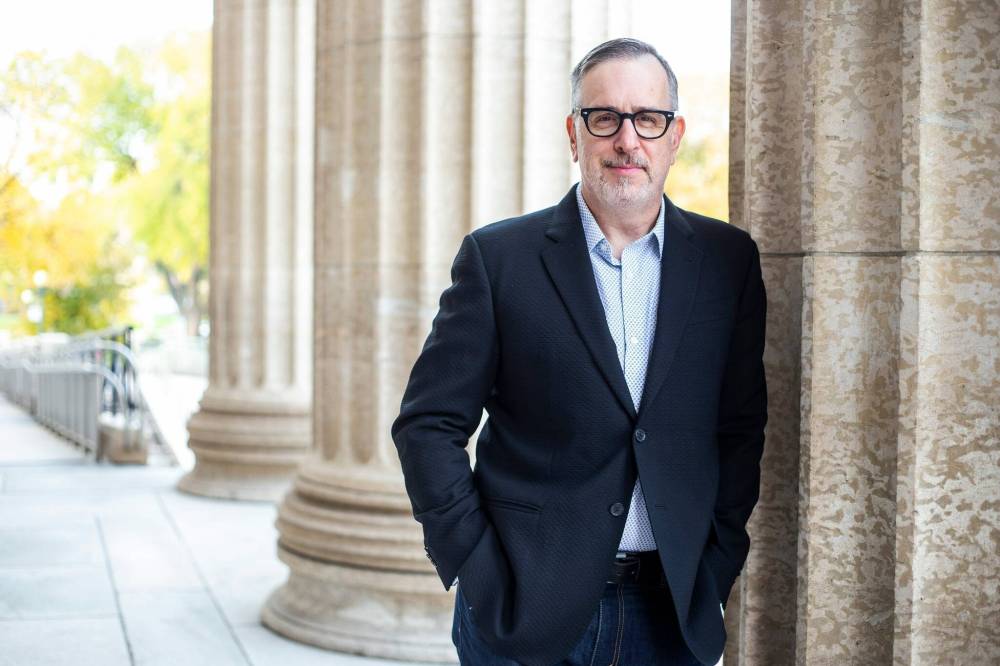
Twice in my career, I’ve had the honour of walking out of a prison or courthouse with someone who has been freed from a lengthy wrongful conviction that we fought in the pages of the Free Press.
Freeing someone from a wrongful conviction is like moving a mountain. The challenge is daunting, bordering on impossible. Politicians, police and prosecutors work diligently to frustrate your every move. And no one really believes you can succeed. But I know for a fact it can be done. David Milgaard was freed in 1991. James Driskell was freed in 2003.
It can be done.
The Free Press was not solely responsible for getting those men out of prison; it takes a small village of lawyers, supporters and journalists to get the job done. But the work we did investigating their cases, and the pressure we put on officials in government and the justice system, played a major role. So, when people ask me if newspapers are still relevant, and whether they still have influence, I tell them about David Milgaard and James Driskell.
And about how I saw a newspaper move a mountain.
Maggie Macintosh, Education reporter
Joined the Free Press in 2019
Maggie Macintosh outside a school-district building in Winnipeg. (Mikaela MacKenzie / Winnipeg Free Press)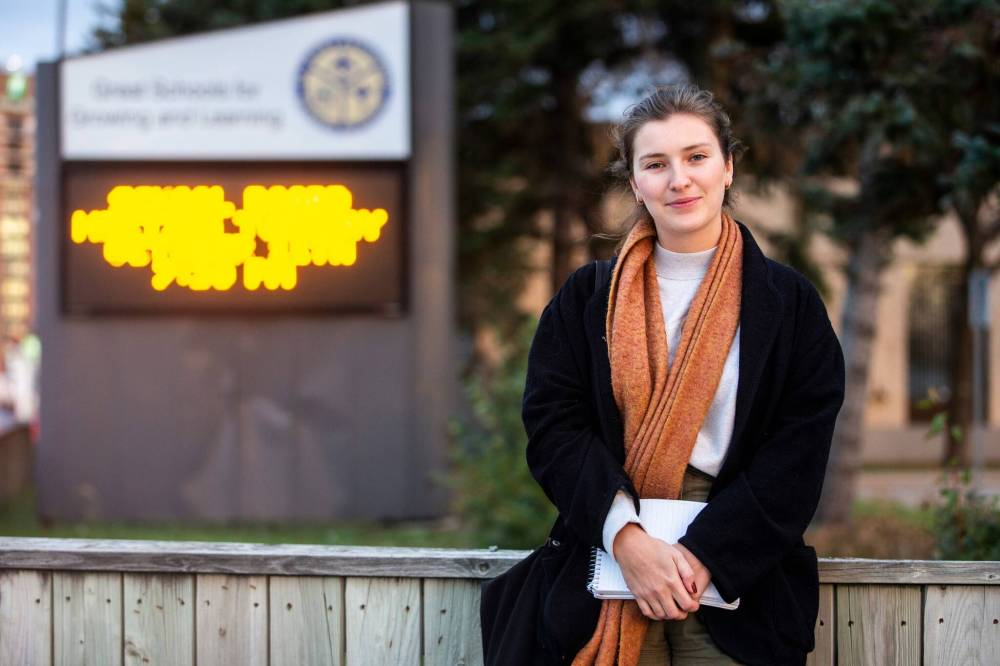
A mentor of mine once told me that, “You know you’re doing your job right when everyone is mad at you.” Her rationale? A journalist’s job is never to be anyone’s personal campaign manager.
We are tasked daily with finding the grey in black and white — and that often does not sit right with someone pushing an agenda.
Throughout my time at the Free Press, I’ve received my fair share of critical emails. I read them and reflect on those with merit. I’ve also answered countless calls from sources and strangers who are grateful the paper covered an often-overlooked topic, held powerful people to account, or simply learned something new.
Our recent investigation into Brandon University’s mishandling of a sexual misconduct case prompted many thank-you notes. It was the paper’s legacy of diligent and nuanced journalism that led a group of student athletes to reach out to me with their case in the first place. With the women’s help, I tracked down documents to expose their school’s incomplete probe into a coach’s alleged pattern of sexual harassment.
The reporting we did prompted BU to suspend the employee in question, hire an independent investigator — who concluded wrongdoing, resulting in an end to his tenure — and launch an overarching review into its athletics department.
The Free Press values balance, but we are biased towards the truth.
Even though I am still developing a thicker skin to handle harsh criticism, I welcome it. Reader insights of all kinds remind me how vitally important our work is and that we must hold ourselves to a high standard.
It’s your turn
Now that you’ve heard from newsroom staff, we want to hear from readers like you about your connection to the Free Press and what this newspaper means to you.
Every reader has their own stories, their own reasons for turning to the Free Press. As part of our 150th anniversary, we want to shine a spotlight on those who we serve with our journalism.
Please take a few minutes to tell us about your experience with the Free Press. What you love about your newspaper. What it means to you. A time when the Free Press helped you or served an important role in your life. A time when you, your friends, your family or community appeared on our pages. Why you believe the Free Press matters to this city and province.
We’ve created a portal for you to send us your submission. As we near our anniversary date of Nov. 30, we’ll share your stories with our audience both online in print.
Note: If you are unable to send your submission to us digitally, please mail your entry to Free Press 150 Reflections, “Care of” the Newsroom, 1355 Mountain Ave., Winnipeg, Manitoba, R2X 3B6.
History
Updated on Friday, October 14, 2022 7:30 PM CDT: Fixes typo




